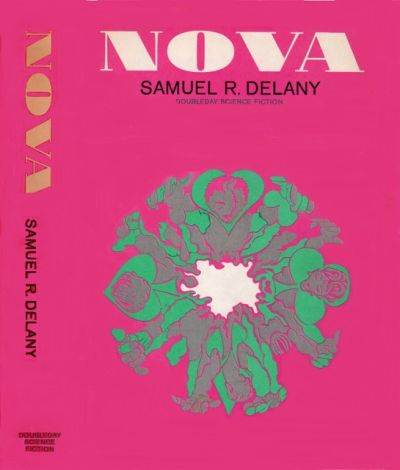You’re My Obsession
Nova
By Samuel R. Delany

26 Feb, 2017
Because My Tears Are Delicious To You
0 comments
Samuel R. Delany’s 1968 Nova is a standalone science fiction novel.
Draco, an Earth-led alliance, and its youthful rival, the Pleiades Federation, dominate the human portion of the galaxy. Both powers dabble in the affairs of the recently settled Outer Colonies. Those hostile young planets harbor traces of the ultra-heavy element illyrion, an element essential to tech as diverse as faster-than-light drives and terraforming.
Until the Outer Colonies were settled, no natural sources of illyrion were known. Illyrion could only be produced by an expensive transmutation process. Cheaper illyrion has shifted the balance of power.
Lorq Von Ray has a bold scheme to alter the galactic political landscape yet again. He will double the aggregate stores of Illyrion in one daring voyage! All he and his crew need do is race into the heart of a star. An exploding star.
Prince and Ruby Red, scions of one of Draco’s greatest and most powerful families, see Von Ray’s ancestors as pirates whose only claim to status is their previous success at stealing that which was rightfully Red’s. Prince in particular is determined to see Von Ray crushed. The alternative is for the status quo to change (and not in favour of Draco). That is completely unacceptable to the proud Prince.
Von Ray knows that it’s possible to survive flying through a nova because his crewman Dan was on a ship that did just that. The ship that managed this feat didn’t intend to do so; no one knows WHY they succeeded. Several explanations have been proposed and it is not clear which is correct. (The eventual explanation is, um, astounding.). Nevertheless, determined to recover the illyrion he knows is cooked in novae, Von Ray sets out to duplicate the feat.
Dan, the one survivor of the previous nova passage, will be of no help. He is blinded in one of Von Ray’s earliest attempts to delve into a nova. Despairing, he kills himself.
Otherwise, the latest expedition looks possible. Von Ray is well-connected; finding a suitable proto-nova won’t be a problem. He is also wealthy; acquiring a ship is not difficult. Thanks to advances in user interfaces, even very advanced technology is very user-friendly; finding people with the technical ability to operate a starship is easy. Even finding people foolish enough to ride a fragile spacecraft into the depths of a nova is not that hard; there have always been people with more boldness than sense.
Prince and Ruby Red, on the other hand, may be the deadly obstacle that even the obsessive Von Ray cannot overcome.
~oOo~
Let me start by saying what a relief it is to read an SF novel written by someone with enough economic savvy to understand that if you vastly increase the supply of a good, you will force prices down and thus greatly expand the applications for which the material might be used. Before the Hall – Héroult process, aluminum was precious enough for kings. After the Hall – Héroult process, it was cheap enough for industry. Industry improved far more lives than royal trinkets.
Speaking of royals … the one-armed Prince, sensitive to the point of violence about his artificial arm, reminded me of Kaiser Bill, not a historical figure I would expect American authors and readers to reference. Am I seeing something that isn’t there because I’ve been reading a fair bit of World War One-related material?
Nova was nominated for a Best Novel Hugo, along with John Brunner’s Stand on Zanzibar (which won), Alexei Panshin’s Rite of Passage, R. A. Lafferty’s Past Master and Clifford D. Simak’s The Goblin Reservation. It is interesting company. The nominees were works that were both conventional and experimental at the same time (plus however you might describe Lafferty’s writing).
Nova is conventional in some senses: it’s a standard quest novel in which a diverse collection of colourful adventurers come together to undertake a foolhardy voyage in the hope of winning fame and treasure. It is a tale at least as old as Jason and the Argonauts.
Where Nova is unconventional is in terms of style. Readers expecting a straightforward story of derring-do like “Brightside Crossing” might have been surprised by Delany’s use of shifting perspectives and multiple flashbacks.
Nova also has a somewhat more diverse cast than was typical of SF in 1968. Earth still seems extremely well-supplied with white people1 (although you can read some passages as suggesting that Peking, as it was called then, is the paramount city), but Von Ray is of mixed Norwegian/Senegalese descent. Such mixture is hinted as typical of both the Federation and the Outer Colonies.
Delany’s mix of experiment and convention is quite effective. The novel is not as ambitious as were later Delanys, but one can see the seeds of future Delany novels in this one.
Nova is available here (Amazon) and here (Chapters-Indigo).
Please direct corrections to jdnicoll at panix dot com
1: Violent white people: the Romani crew member recalls mobs that mutilated and lynched so-called gypsies for flagrantly daring to exist.
